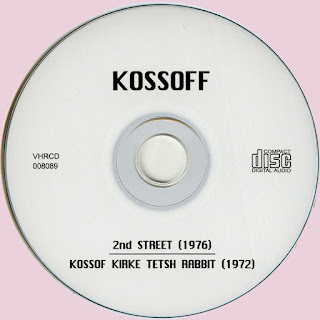This album was only privately released and now sees the light again. It is a special recording which does not reveals itself after one listen. Most of the album sounds as if this is a Christian or otherwise spiritual inspired item, in a hippie fashion, with driven soul in the vocals, and with speeded up rhythms heading for the light, using rock rhythms, covers or originals for enlightenment. Also the instrumentation is pretty weird and beautiful. There’s use of electric piano and an Arp synthesizer which produces some unusual sounds.
On “Right track” this track sound as if this is orchestrated, but I think the keyboards were responsible for this effect. Also electric and acoustic autoharp provides more special acoustic and emi-electronic touches. The female singer, Wendy, has a beautiful folk-like voice, with some range in her singing. Her voice fits well everywhere, like on the opening track, a cover of the beautiful Moody Blues track (which is one of many people’s all time favourite’s songs) “Nights in a White Satin” ,with additional backing male voice, oscillating violin, electric piano and percussion.
There’s often a sing-a-long and celebrate feeling, from rock to more pastoral, like the closer, “Wind”, a track which has the most psychedelic atmosphere, with an ethereal folkvoice, moody electric piano and bass.
Psychedelic-Folk
The band, originally called Roger And Wendy, was formed in the late '60s in Greenwich Village, typically playing in pass-the-basket-for-tips coffeehouses and folk clubs, such as Gerde's Folk City, (where they headlined for 33 weeks in one year,1970, setting a club record); the Cafe Wha?, the Bitter End, the Cafe Au Go Go, The Gaslight Cafe, The Freudian Slip, The Basement Cafe, and Kenny's Castaways.
Performing at first without microphones (as basket houses had no cabaret licenses, thus amplified vocals were illegal), they developed an energized psychedelic folk style with just an electrified autoharp and fast-pulse bass guitar. Their music quickly evolved from traditional ballads to electric folk, including psych folk, acid freak folk and rock. Roger and Wendy took the stage names Roger Becket and Wendy Becket when they had become involved with the Theater Company of Boston, and then in several off-Broadway plays.
They kept these pseudonyms through much of their musical career before returning to their original surname of Penney. This accounts for some of the confusion regarding credit for albums. Wendy is a lifetime member of the Art Students League of New York.
Tracks
Musicians
*Wendy Penney - Vocals, Bass
*Sam Becket - Drums, Percussion, Violin
*Roger Penney - Vocals, Electric Autoharp, Organ, Piano, Arp
On “Right track” this track sound as if this is orchestrated, but I think the keyboards were responsible for this effect. Also electric and acoustic autoharp provides more special acoustic and emi-electronic touches. The female singer, Wendy, has a beautiful folk-like voice, with some range in her singing. Her voice fits well everywhere, like on the opening track, a cover of the beautiful Moody Blues track (which is one of many people’s all time favourite’s songs) “Nights in a White Satin” ,with additional backing male voice, oscillating violin, electric piano and percussion.
There’s often a sing-a-long and celebrate feeling, from rock to more pastoral, like the closer, “Wind”, a track which has the most psychedelic atmosphere, with an ethereal folkvoice, moody electric piano and bass.
Psychedelic-Folk
The band, originally called Roger And Wendy, was formed in the late '60s in Greenwich Village, typically playing in pass-the-basket-for-tips coffeehouses and folk clubs, such as Gerde's Folk City, (where they headlined for 33 weeks in one year,1970, setting a club record); the Cafe Wha?, the Bitter End, the Cafe Au Go Go, The Gaslight Cafe, The Freudian Slip, The Basement Cafe, and Kenny's Castaways.
Performing at first without microphones (as basket houses had no cabaret licenses, thus amplified vocals were illegal), they developed an energized psychedelic folk style with just an electrified autoharp and fast-pulse bass guitar. Their music quickly evolved from traditional ballads to electric folk, including psych folk, acid freak folk and rock. Roger and Wendy took the stage names Roger Becket and Wendy Becket when they had become involved with the Theater Company of Boston, and then in several off-Broadway plays.
They kept these pseudonyms through much of their musical career before returning to their original surname of Penney. This accounts for some of the confusion regarding credit for albums. Wendy is a lifetime member of the Art Students League of New York.
1. Nights In White Satin (Justin Hayward, Peter Knight) - 2:59
2. Right Track (Roger Penney) - 4:12
3. Dream On (Steven Tyler) - 4:36
4. Lark In The Morning/Swallowtail (Traditional) - 1:20
5. Free Ride (Roger Penney) - 3:03
6. Standing Together (Roger Penney) - 3:11
7. Louisiana (Roger Penney) - 2:36
8. Night Train (Roger Penney) - 5:33
9. Wind (Bob Bruno) - 3:48
10.Tucson (Tom Pacheco) - 3:01
11.Bright Light Princess (Roger Penney) - 4:02
12.My Brother (Wendy Penney) - 4:37
13.Jambalaya (Hank Williams) - 3:23
14.Always Love You (Doly Parton) - 2:24
15.You Must Forget (Tom Pacheco) - 3:37
Bonus tracks 10-15
Tracks 1-9 recorded 1977
Tracks 10,16 recorded 1969
Tracks 12,14 recorded 1974
Tracks 11,13 recorded 1976
Musicians
*Wendy Penney - Vocals, Bass
*Sam Becket - Drums, Percussion, Violin
*Roger Penney - Vocals, Electric Autoharp, Organ, Piano, Arp
Related Act
































